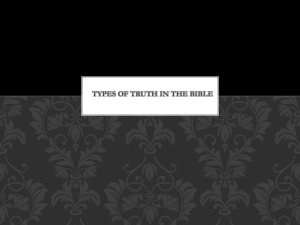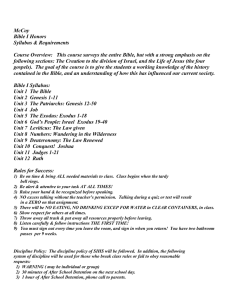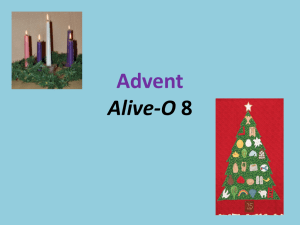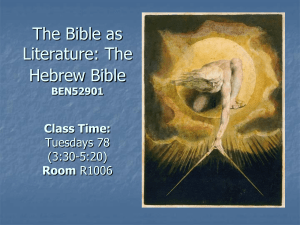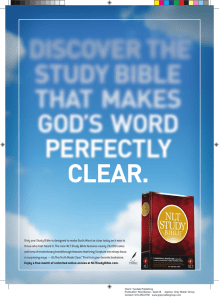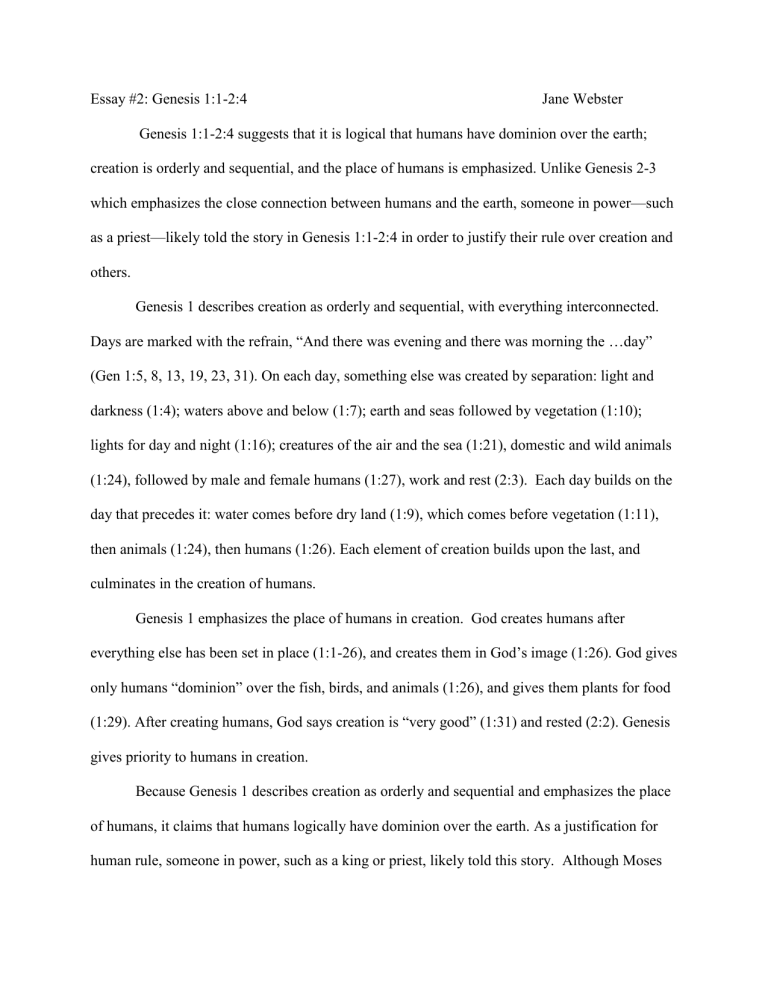
Essay #2: Genesis 1:1-2:4 Jane Webster Genesis 1:1-2:4 suggests that it is logical that humans have dominion over the earth; creation is orderly and sequential, and the place of humans is emphasized. Unlike Genesis 2-3 which emphasizes the close connection between humans and the earth, someone in power—such as a priest—likely told the story in Genesis 1:1-2:4 in order to justify their rule over creation and others. Genesis 1 describes creation as orderly and sequential, with everything interconnected. Days are marked with the refrain, “And there was evening and there was morning the …day” (Gen 1:5, 8, 13, 19, 23, 31). On each day, something else was created by separation: light and darkness (1:4); waters above and below (1:7); earth and seas followed by vegetation (1:10); lights for day and night (1:16); creatures of the air and the sea (1:21), domestic and wild animals (1:24), followed by male and female humans (1:27), work and rest (2:3). Each day builds on the day that precedes it: water comes before dry land (1:9), which comes before vegetation (1:11), then animals (1:24), then humans (1:26). Each element of creation builds upon the last, and culminates in the creation of humans. Genesis 1 emphasizes the place of humans in creation. God creates humans after everything else has been set in place (1:1-26), and creates them in God’s image (1:26). God gives only humans “dominion” over the fish, birds, and animals (1:26), and gives them plants for food (1:29). After creating humans, God says creation is “very good” (1:31) and rested (2:2). Genesis gives priority to humans in creation. Because Genesis 1 describes creation as orderly and sequential and emphasizes the place of humans, it claims that humans logically have dominion over the earth. As a justification for human rule, someone in power, such as a king or priest, likely told this story. Although Moses was traditionally understood to be the author of this story, many scholars now agree that this story was written down by P, a priest (or group of priests) in the 6th C. B.C.E. during the exile.1 Rosenberg argues that the author was familiar with the Babylonian creations story of the Enuma Elish which claims that the world was created out of divine combat.2 Coogan adds that, in the Enuma Elish, humans are created from the blood of an enemy god in order to serve the gods.3 The priestly account of Genesis thus raises the status of humans to be “in the image of god.” 1 Joseph Blenkinsopp, The Pentateuch: An Introduction to the First Five Books of the Bible (New York: Doubleday, 1992), 55; Ronald S. Hendel, “Book of Genesis,” pages 933-941 in Volume 2 of The Anchor Bible Dictionary (David Noel Freedman, ed.; New York: Doubleday, 1992), 934; Roland Murphy, “Introduction to the Pentateuch,” pages 3-7 in The New Jerome Bible Commentary (Raymond E. Brown, Joseph A. Fitzmyer, and Roland E. Murphy, eds.; London: Geoffrey Chapman, 1989), 4; Susan Niditch, “Genesis,” pages 27-45 in Women’s Bible Commentary Revised and Updated (Carol Newsom, Sharon Ringe, Jacqueline Lapsley, eds.; Louisville, KY: Westminster John Knox, 1998), 28; Kent H. Richards, “Priestly Writer(s),” HarperCollins Bible Dictionary Revised Edition (Paul J. Achtemeier, ed.; San Francisco: HarperCollins, 1996), 879. 2 Joel W. Rosenberg, “Creation,” pages 209-210 in HarperCollins Bible Dictionary Revised Edition (Paul J. Achtemeier, ed.; San Francisco: HarperCollins, 1996), 209. 3 Michael D. Coogan, A Brief Introduction to the Old Testament: The Hebrew Bible in its Context (New York: Oxford University Press, 2009), 29. Bibliography Blenkinsopp, Joseph. The Pentateuch: An Introduction to the First Five Books of the Bible. New York: Doubleday, 1992. Print. Brown, William P. “Genesis.” Pages 367-368 in HarperCollins Bible Dictionary Revised Edition. Paul J. Achtemeier, general editor. San Francisco: HarperCollins, 1996. Print. Coogan, Michael D. A Brief Introduction to the Old Testament: The Hebrew Bible in its Context. New York: Oxford University Press, 2009. Print. Hendel, Ronald S. “Book of Genesis.” Pages 933-941 in Volume 2 of The Anchor Bible Dictionary. David Noel Freedman, editor in chief. New York: Doubleday, 1992. Print. Murphy, Roland. “Introduction to the Pentateuch.” Pages 3-7 in The New Jerome Bible Commentary. Edited by Raymond E. Brown, Joseph A. Fitzmyer, and Roland E. Murphy. London: Geoffrey Chapman, 1989. Print. Niditch, Susan. “Genesis.” Pages 13-29 in Women’s Bible Commentary Expanded Edition with Apocrypha. Carol Newsom and Sharon Ringe, editors. Louisville, KY: Westminster John Knox, 1998. Print. Richards, Kent H. “Priestly Writer(s).” Page 879 in HarperCollins Bible Dictionary Revised Edition. Paul J. Achtemeier, general editor. San Francisco: HarperCollins, 1996. Print. Rosenberg, Joel W. “Creation.” Pages 209-210 in HarperCollins Bible Dictionary Revised Edition. Paul J. Achtemeier, general editor. San Francisco: HarperCollins, 1996. Print.

